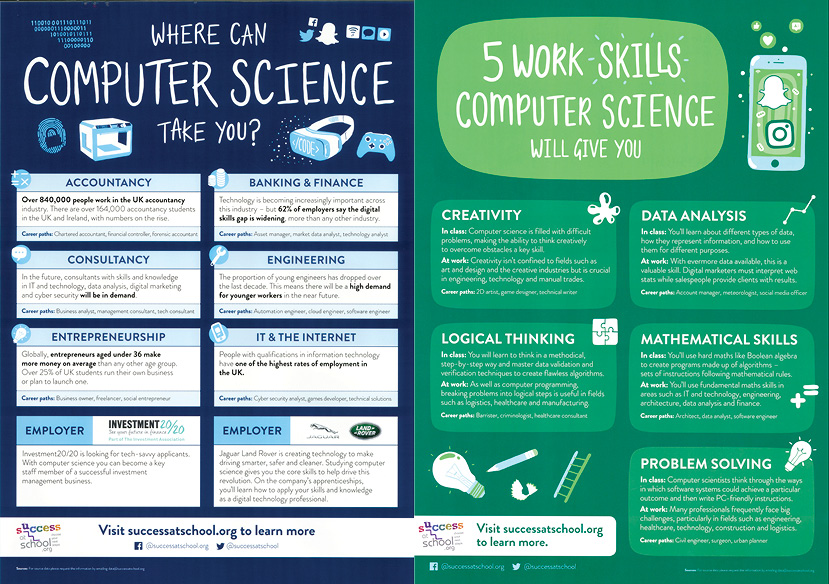Computer Science
Key Stage 3 (Year 7-9)
Year 7
-
E-Safety
-
Hardware & Software
-
Digital Literacy
-
Computational Thinking
-
Developing Algorithms in Scratch
-
Spreadsheet Modelling
-
Representing Images
-
Web page Creation
Year 8
- Hardware and Software
- Python Programming Basics
- Database Development and queries
- Developing a webpage using HTML
- Games Development
Year 9
- Network and Legislations
- Python Programming Intermediate
- Binary and Logic
- Hacking Preventative Measures
- Graphics Animation
Key Stage 4 (Year 10-11)
GCSE 9-1 Computer Science
Year 10
- Unit 1-System Architecture, Memory, Storage, Wired and Wireless Networks, Topologies, Protocols and Layers
- Unit 2-Algorithms, Programming
Year 11
- Unit 1-System Security, Systems Software, Ethical, Legal, Cultural and Environmental Concerns
- Unit 2- Computational Logic, Translators and Facilities of Languages, Data Representation
BTEC Level 2 Tech Award in Digital Information Technology
Year 10
Component 1: Exploring User Interface Design Principles and Project Planning Techniques
Aim: How to project plan the design and development of a user interface.
Assessment: internally assessed assignments
- explore user interface design and development principles
- discover how to develop and review a digital user interface
- investigate how to use project planning techniques to manage a digital project
Component 2: Collecting, Presenting and Interpreting Data
Aim: process and interpret data and draw conclusions
Assessment: internally assessed assignments
- explore how data impacts on individuals and organisations • develop a dashboard using data manipulation tools
- draw conclusions and make recommendations on data intelligence
Year 11
Component 3: Effective Digital Working Practices
Aim: explore how organisations use digital systems and the wider implications associated with their use.
Assessment: scenario-based external assessment where students demonstrate their knowledge to propose digital solutions to realistic situations.
- explore how modern information technology is evolving
- understand what cyber security is and how to safeguard against it
- consider legal and ethical issues in data and information sharing
Key Stage 5 (Year 12-13)
Year 12
A Level Computer Science
Unit 1: Computer Systems
1. Systems Architecture
- Structure and function of the CPU
- Fetch-Decode-Execute cycle
- Factors affecting CPU performance
- Types of processors (e.g., CISC, RISC)
2. Memory and Storage
- Types of memory (RAM, ROM, virtual memory, flash storage)
- Secondary storage technologies
- Data representation (binary, hexadecimal, ASCII, Unicode, images, sound, compression techniques)
3. Software
- Operating systems: functions and types
- Application software vs. system software
- Utility software
- Open source vs. proprietary software
4. Networks
- Types of networks (LAN, WAN, WLAN)
- Protocols (e.g., TCP/IP, HTTP, FTP)
- Network topologies and hardware
- The concept of the Internet and the World Wide Web
5. Ethical, Legal, and Cultural Issues
- Legislation related to computer science (e.g., GDPR, Computer Misuse Act)
- Ethical and cultural considerations in technology
Unit 2: Algorithms and Programming
1. Programming Basics
- Fundamentals of programming (variables, data types, control structures)
- Input/output operations
- Functions and procedures
2. Data Structures
- Arrays, records, stacks, queues
- Basic file handling
3. Computational Thinking
- Abstraction, decomposition, and problem-solving techniques
- Representing algorithms using pseudocode and flowcharts
4. Standard Algorithms
- Searching algorithms (e.g., linear, binary search)
- Sorting algorithms (e.g., bubble, insertion, merge sort)
BTEC Level 3 National Extended Diploma in Computing
Unit 1- Principles of Computer Science
Unit 2 – Fundamentals of Computer Systems
Unit 3 – Planning and Management of Computer Systems
Unit 4 – Software Design and Development Project
Unit 8 -Business Application of Social Media
Unit 10 -Human-computer Interaction
Unit 15 – Website Development
Unit 14 – Computer Games Development
Year 13
A Level Computer Science
Unit 1: Computer Systems
1. Advanced Topics
- Boolean algebra and logic gates
- Hardware and software integration
- Emerging technologies
2. Data Security
- Encryption methods
- Cybersecurity threats and prevention
- The role of firewalls and antivirus software
3. Databases
- Database design and normalization (1NF, 2NF, 3NF)
- SQL and database querying
Unit 2: Algorithms and Programming
1. Advanced Programming
- o Object-oriented programming (OOP) principles
- o Recursion
- o Exception handling
2. Complex Data Structures
- o Linked lists, trees, hash tables, graphs
- o Algorithm efficiency (Big-O notation)
3. Computational Methods
- o Understanding and solving more complex computational problems
Unit 3: Programming Project
The Programming Project is an independent piece of work. Key steps include:
- Problem Identification - Choose a real-world problem that is computationally solvable.
- Analysis - Produce a detailed problem statement, requirements, and a feasibility study.
- o Design - Plan the solution using algorithms, pseudocode, and flowcharts.
- Development - Write the code using a chosen programming language.
- o Testing - Use a systematic test plan to identify and fix issues.
- o Evaluation - Assess the success of the project and reflect on the process.
BTEC Level 3 National Extended Diploma in Computing
Unit 7 – IT System Security and Encryption
Unit 9 – The Impact of Computing
Unit 18 – Relational Database Development
Unit 22 – Systems Analysis and Design
Unit 19 – Computer Networking
Independent Learning Resources
Key Stage 3
- http://teach-ict.com/– Students have been given a login access to this website. There is structured revision material as well as quizzes for the students to access for the KS3 computing topics.
- http://classroom.google.com– Using the students Google drive login, students have access to all resources provided in lessons, including presentation, worksheets and revision notes.
Key Stage 4
OCR
- CGP Revision Book for GCSE Computer Science
- OCR (9-1) Computer Science GCSE (Hodders Educations)
- Digital subscription of revision book for BTEC IT.
- http://teach-ict.com/– Students have been given a login access to this website. There is structured revision material as well as quizzes for the students to access for the new GCSE course.
- http://classroom.google.com– Using the students Google drive login, students have access to all resources provided in lessons, including presentation, worksheets and revision notes.
Careers Advice








